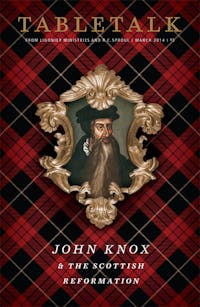
Request your free, three-month trial to Tabletalk magazine. You’ll receive the print issue monthly and gain immediate digital access to decades of archives. This trial is risk-free. No credit card required.
Try Tabletalk NowAlready receive Tabletalk magazine every month?
Verify your email address to gain unlimited access.
Perhaps more than anything else, John Knox is known for his prayer “Give me Scotland, or I die.” Knox’s prayer was not an arrogant demand, but the passionate plea of a man willing to die for the sake of the pure preaching of the gospel and the salvation of his countrymen. Knox’s greatness lay in his humble dependence on our sovereign God to save His people, revive a nation, and reform His church. As is evident from his preaching and prayer, Knox believed neither in the power of his preaching nor in the power of his prayer, but in the power of the gospel and the power of God, who sovereignly ordains preaching and prayer as secondary means in the salvation of His people.
Although Knox had been imprisoned and enslaved, and though he was often infirm and under threat of persecution, he consistently lived out his theology, believing that “one man with God is always in the majority.” As such, the prayers of one man heard at the throne of God were a threat to the throne of Scotland. During the time of the sixteenth-century Scottish Reformation, Knox’s ministry of preaching and prayer were so well known that the Roman Catholic Mary, Queen of Scots, is reputed to have said, “I fear the prayers of John Knox more than all the assembled armies of Europe.”
Above all, Knox was a committed pastor and churchman whose ministry served as a compass to numerous pastors throughout Scotland. Knox’s unwavering commitment to the pure preaching of the gospel was a bright and shining light amid the darkness in a nation steeped in doctrinal and ecclesiastical compromise. He reinvigorated God’s shepherds throughout the nation; this, in turn, reformed the church and, thus, in God’s providence, revived the country. Most notably, what inspired the pastors perhaps more than any other characteristic in Knox was that he did not fear men, because he feared God—he was a man willing to offend men, because he was unwilling to offend God.
John Knox preached and prayed to the end that God would rescue Scotland precisely because he was clinging to Jesus’ promise and prayer to save His people from every tribe, tongue, and nation. It should be no surprise to us then that when Knox was near death, he asked his wife to read to him the High Priestly Prayer in John 17 that our Lord Jesus prayed the night before He went to the cross. Knox called this passage “my first anchor.” For indeed, Christ is the captain of our souls and Christ’s prayer is the anchor and only hope of the nations. Therefore, in light of so great an example of God’s power working through one man, let each one of us pray with the same passion for our nation—and all nations—as Knox prayed for Scotland.
